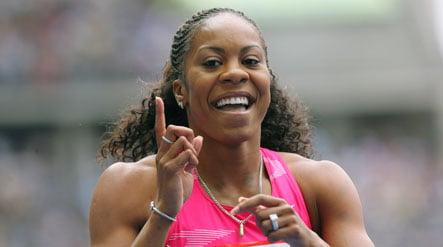With the world championships to be held here in August, Richards blitzed around Berlin’s Olympic Stadium track in 49.57secs to show Britain’s absent Beijing champion Ohuruogu what she will have to beat to claim world gold.
“I came here to run fast. I didn’t even go shopping before the race, so I saved all my energy for this race,” joked the American. “I am really looking forward to coming back in August and leaving Berlin with gold.”
Richards made no secret of the fact that she was disappointed to lose to the Brit in Beijing, but the 24-year-old has been world number one since 2005 and is eager to underline her consistent form by winning the world crown here later this summer.
A share of the million-dollar stake is up for grabs for any athlete in the 10 jackpot events who win all six Golden League meetings this year. Kenyan middle-distance runner Pamelo Jelimo was the outright millionaire winner last season, but one-lap specialist Richards is on track to become only the second woman to capture a piece of the jackpot for a third time.
World high-jump champion Blanka Vlasic is already out of the running after she was beaten by local hero Ariane Friedrich, the European indoor champion, but the Croatian jump queen admitted she was not concerned.
“At this stage of the season, I don’t have too many concerns,” she said. “I am not injured and I am going to improve throughout the season, I am not worried.”
To the crowd’s delight, Friedrich leapt 2.06m to set a new German record and claim victory in a bitter defeat for Vlasic who also lost out to the 25-year-old in Brussels’ Golden League meet last year to be denied her share of the jackpot.
Ethiopia’s Kenenisa Bekele, the Olympic champion and world record-holder at both the 5,000m and 10,000m, held off a strong Kenyan challenge to win the 5,000m here in a world leading time of 13min 00.76secs.
Russia’s pole-vault star Yelena Isinbayeva started the season where she left off, as the world’s best with a leap of 4.83m. The double Olympic and world champion again finished well clear of the field and has few rivals with two months to go before the world championships.
While triple Olympic champion Usain Bolt passed over his chance to claim a share of the million-dollar jackpot, instead running 10.00secs in Canada over the weekend, his training partner Daniel Bailey took the men’s 100m here.
“I came here to win this race, so I can’t be disappointed,” said Bailey after his win. “I came here sick and I am recovering from ‘flu, so my time is alright. The track feels fast and I am sure I can go faster at the world championships.”
The Antiguan ran 10.03secs in a field missing any names who ran the Olympic final, while Bolt will be back at Berlin’s Olympic Stadium in August to attempt to add world golds to his 100m, 200m and 4x100m relay golds from Beijing.
In the women’s 100m, Jamaica’s Kerron Stewart ran 11 seconds dead to claim victory despite a stumbling start.
“That feels so good, I didn’t expect to run that fast and I even stumbled out of the blocks, so I have no complaints,” said the 25-year-old, who won two gold medals in Beijing.
Olympic silver-medallist and world indoor champion Godfrey Mokoena of South Africa won the long jump with a leap of 8.33m, while Germany’s European indoor record-holder Sebastian Bayer finished back in seventh after jumping 7.95m.
Finland’s Tero Pitkamaki, the 2007 world javelin champion, came out on top in his titanic tussle with double Olympic champion Andreas Thorkildsen of Norway, who beat him in Beijing. The Finn threw a season’s best 86.53m while his Norwegian rival threw 85.48m to finish second.
Kenya’s Augustine Choge led a Kenyan clean sweep in the men’s 1500m when he ran the fastest time in the world since 2006 to claim victory in 3min 29.47secs from compatriots Haron Keitany and William Biwott in third.
It was Choge’s third 1500m win in Berlin after successes in 2006 and 2008. Beijing Olympic finalist Damu Cherry opened her Golden League season in style when the United States sprinter won the women’s 100m hurdles in 12.76seconds from Jamaica’s Lacena Golding-Clarke.
In the men’s 110m hurdles, the United States went one-two-three with Dexter Faulk winning in a time of 13.18secs from compatriots Ryan Wilson and David Payne.



 Please whitelist us to continue reading.
Please whitelist us to continue reading.
Member comments